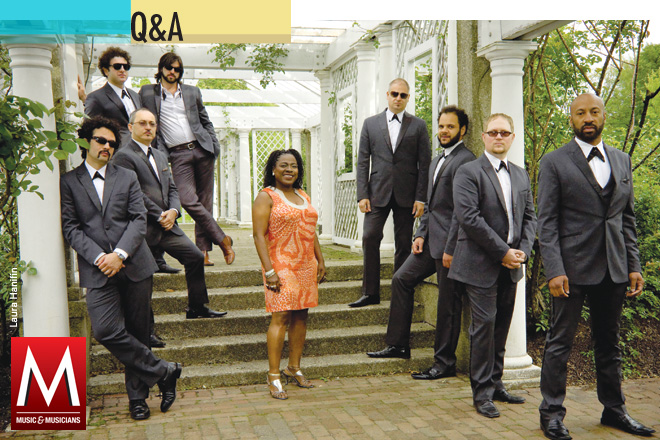SHARON JONES & THE DAP-KINGS
One of soul’s leading ladies brings the boys back home
The master funkateers in the Dap-Kings have earned mainstream attention over the last several years for their work with big-name artists like Amy Winehouse and Jay-Z, but their one true leader is soul singer extraordinaire Sharon Jones. Their new album together as Sharon Jones and the Dap-Kings, I Learned the Hard Way, is the fourth of their almost decade-long collaboration and their first since 2007’s critically acclaimed 100 Days, 100 Nights. Augusta, Ga., native Jones, 53, took a break from a game of Wii bowling at her home in Queens to talk about the new album, her band’s extracurricular activities and her definition of soul.
Were you surprised when your music began attracting a young audience?
No, I wasn’t surprised. When the Dap-Kings were doing the 45s [a series of singles the group released in the early 2000s], the audience was the young college students, the underground. The only thing with us, we never gave up. We stayed with it. Why do you think everybody came to us? Why do you think Amy and [producer] Mark [Ronson] and Jay-Z and all the rest of them wanted to come and get this sound we had? ’Cause we got the sound and we don’t vary from it.
It’s been a few years since Winehouse borrowed the Dap-Kings for her back-up band. How do you look at that now?
The whole thing took me a little by surprise. The Dap-Kings didn’t even know what was going on when Mark came to them. Actually while they were out with Amy, a little opportunity came for me, the movie, so it all worked out. [Jones appeared in 2007’s The Great Debaters.] But I don’t think they gave us enough recognition. There should have been a thing: “Dap-Kings really had the sound that we wanted. I listened to Sharon Jones and the Dap-Kings and that’s what inspired me to come on out.” But they wouldn’t say that, of course not. But they sort of got us turned on to a bit of a different audience. It helped us—that’s how I look at it. I wish her the best to get back out there.
What do you say to critics who think your music is too retro?
They can say whatever the hell they want to say. We go in the studio to make good-sounding music, and we’re sticking to soul and what we do. They want pop, hip-hop, then go somewhere else. Don’t talk bad about us. We’re doing what we want to do. You don’t like what we’re doing? Move on. If I’d lived my life listening to what people had to say—too big, too short, too fat, once you pass 50 you’re too old—I wouldn’t be where I’m at right now.
In the 1980s you worked as a guard at New York’s notorious Rikers Island. Anything from that experience affect your music?
That just taught me to not be afraid. But it didn’t take jail to show me that, because I never would have gotten the job if I’d been afraid. I live in the ghetto, been raised in the ghetto. People try to rob you, all this kind of stuff. But I’ve learned you look people in the eye, you don’t show no fear, and that’s the thing that gets you by. That may have helped me, because I can’t show no fear on stage. You get up there and show fear, everybody in the audience will know it. They’ll feel it. You got to go up with confidence. You got to take control. And the Dap-Kings, when they see me in control and they see me feeling good, they feel good. When the audience sees all of us feeling good, what you got going on? A big room of everybody feeling good just feeding off of each other. To me that’s the definition of soul.
–Richard Cromelin




comment closed